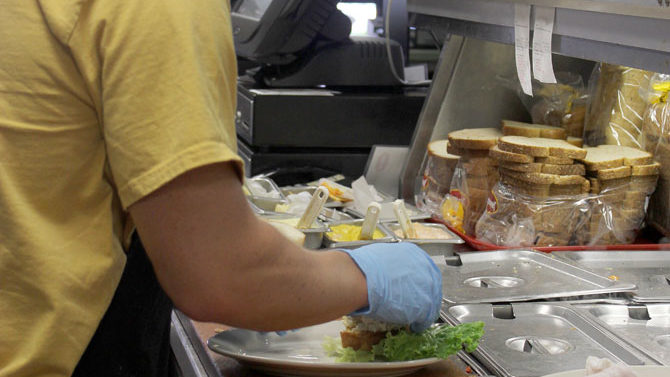Joshua Scott, 19, is looking forward to working. The 19-year-old graduated earlier this month from Athens Community Career Academy with training as an electrician, and before he even had his diploma in his hands, he was out looking for a job. “I just want to work,” he said on a recent afternoon at the Georgia Department of Labor office. “I like working with my hands.”
With some luck, Scott will be able to take his training and turn it into a job with a private electrician or an electrical components company in town, where the average salary, according to the Georgia Department of Labor, is about $900 a week. On the other end of Scott’s job-search spectrum are Athens’ far more plentiful jobs in food service, hospitality and retail areas. As the commercial hub of Northeast Georgia, Athens-Clarke County has more than 14,000 of these positions, paying $250–$435 a week before taxes.
And their prevalence is a thorn in the side of the county’s constant battle with poverty. With almost 37 percent of ACC’s population living in poverty, having a decent-paying job is a key factor in overcoming that statistic. According to 2011 federal poverty level thresholds, an average family of four would need to make more than $23,050 a year—about $443 a week—to live above the poverty line.
The University of Georgia is often cited as a key reason for Athens’ service-heavy economy, due both to the many low-wage, often temporary jobs it offers and to the large pool of cheap, part-time student labor it supplies. But the prevalence of service-industry jobs is “probably more pronounced here, not necessarily because it’s a college town,” said Doug Bachtel, University of Georgia professor and demographer, but because “it’s a social, cultural, retail economic hub of Northeast Georgia.”
For generations, Bachtel said, residents in surrounding counties came to Athens to shop and dine, creating a culture with plenty of retail and hospitality services. But Athens-Clarke County also is unique because of its low unemployment rate—averaging 7.5 percent last year, compared with 9.8 percent statewide—and high poverty rate, which, according to the 2010 U.S. Census, was 36.7 percent. Those two statistics are linked, Bachtel said, because an abundance of low-paying jobs translates into an abundance of low-income families.
“[We need] better paying jobs across the board, and a better mixture of jobs that pay well,” said Linda Lloyd, director of the Economic Justice Coalition, which has pushed for years to bring the base salary for University of Georgia employees up beyond its current $11.50 per hour. “Because you’re never going to have enough… we just need to advocate for better paying jobs here in Athens.”
A variety of persistent factors has combined with an economic recession to make things especially difficult for Athens families trying to make ends meet.
But with the right tools in place—and they are there—there’s a solution.
By the Numbers
In the Athens-Clarke metropolitan statistical area (which also includes Madison, Oconee and Oglethorpe counties), close to 90 percent of all jobs provide some kind of service. Up the road in Hall County, 76 percent of all jobs are service-related, while in Savannah (Bryan, Chatham and Effingham counties) it’s 86 percent, according to the Georgia Department of Labor. Service-producing jobs can also include administrative assistants, hospital employees or people who provide professional services. But the vast majority of Clarke County’s service-providing jobs are in the retail and hospitality/ food service areas.
And while Clarke County’s unemployment rate looks good compared with the rest of the state or even the nation, it’s nearly doubled in the past five years. From 2001–2007, the unemployment rate held steady at around 4 percent. In 2009 the rate jumped to more than 7 percent, and it’s been between 7 and 8 percent since then.
That, Bachtel said, reflects another difficulty facing ACC’s poor: jobs that would normally go to workers with only a high school diploma are now going to workers with some college education. This leaves the majority of Clarke County’s impoverished population working part-time or temporary jobs.
“You’re dealing with a lot of educated competition [for jobs],” Bachtel said. “You can’t make it with just a high school diploma anymore. You have to go way beyond that. It’s gotta be tech school or vocational school or community college, because of the technological orientation that we have. Those computers—those suckers are everywhere… And if you don’t know all about them, you’re sucking air, or you’re minimum-wage. And that just isn’t going to make it in today’s society.”
When it comes to residents living in poverty, the U.S. Census reports that whites and blacks share the burden—roughly 36 percent of each race lives below the poverty line. Another 44 percent of the county’s Hispanic population lives in poverty, though—and that figure comes with a 20 percent margin for error, according to 2010 figures. And while students who live off-campus could count toward these figures, not all UGA students contribute to the poverty statistics: the Census figures don’t include students living in college dorms (nor people living in “institutions,” such as jails).

Andrew Bir, a line cook at Jason’s Deli, fixes a sandwich plate just before the restaurant’s dinner rush. Jobs in the restaurant industry are plentiful in Clarke County, but also rank as the lowest paid.
Clarke County’s poverty level has more than doubled in about a decade. In 1999, according to the 2011 Georgia County Guide, just 14.8 percent of the population lived below the poverty level.
But living in poverty is also relative; family size and living situation factor into how much money is brought home each month. One way to measure how well a family is living, said Keith McNeely, Sr., director of ACC’s Department of Human and Economic Development, is to look at housing costs as a percentage of a family’s income. When more than 30 percent of a family’s monthly income is spent on housing, that family is “overburdened,” he said.
“You have to take a look at fair market rates… and how much housing someone can buy based on a family’s size,” he said. “If you’re paying more than 30 percent of your household income on living expenses, it’s cost-prohibitive.”
And in Athens, three- and four-bedroom apartments are typically marketed to students at a “per-bedroom” cost, which tends to inflate rental prices overall, McNeeley said. A study his department conducted 10 years ago found that while Clarke County didn’t have a shortage of housing, there weren’t enough places for families that earn 30 percent or less of the median area family income. Today, the median stands at $53,600.
Education as Solution
For decades, Paul DeLargy has helped students at all levels—elementary through college—learn to be entrepreneurs. DeLargy is the director of Georgia REAL Enterprises, a national nonprofit that helps teach students of all ages to run their own businesses and be self-sufficient; he also taught at UGA and developed entrepreneurship programs at the Small Business Development Center there. He is currently a contracted consultant with the state Department of Education. The way DeLargy sees it, Clarke County has all the tools in place to reduce its poverty level—but these tools are simply small steps in a process that takes years, if not generations.
“People need to be aware of the possibility of jobs, and the skills need to be set up at the technical colleges,” he said, noting that Athens Technical College and the Community Career Academy, run through the Clarke County School District, are key venues for training Athenians for higher-paying jobs. In the coming years, DeLargy said, there should be a greater push for students—elementary through high school—to learn entrepreneurial skills. This moves away from the traditional route of graduating and landing a manufacturing job at a company.
Which is good, said Ovita Thornton, who remembers the Athens of 20–30 years ago, when it was bustling with manufacturing jobs.
Those jobs—at DuPont, Westclox, Oliver Rubber and Superior Clothing, for example—moved overseas or were swallowed by the changing economy. And rather than expecting new manufacturing jobs to move in, Thornton said, Athens might also look to small businesses to help bring people out of poverty.
“If we give people a way to develop small businesses, you don’t have to be rich to make it,” said Thornton, a Clarke County School Board member and director of the Georgia Clients Council, a nonprofit that works to bring low-income residents out of poverty through education and training. She noted that there needs to be an overhaul of the county’s permitting process, too, making it easier for businesses of all sizes to settle here.
“The worst thing I can see happening is to [teach] all these job-creation skills and there are no jobs in Clarke County, so we’re back to square one,” she said. “That’s why I think the one area that hasn’t been looked at carefully is entrepreneurs.”
Manufacturing jobs like the ones coming thanks to Caterpillar will also help, Thornton and DeLargy agreed, but they’re not the complete solution. And DeLargy added that while some residents could benefit from shopping at a store such as Walmart—a possible addition to downtown as part of a proposed development at the Armstrong & Dobbs property on Oconee Street—the low-priced goods also bring low-paying jobs, adding to the glut of retail work in the area.
“And at the other end of the problem, you’ve got tons of college kids with degrees. They’ll hire them in a low-paying job before somebody else without a degree,” DeLargy said. “There are a lot of them who owe a lot of money, and they’re taking jobs that won’t pay for it.”
The Right Resources
Budget cuts to the University of Georgia have stymied the EJC’s push for a higher minimum wage for UGA workers—ideally $17 an hour in order to support a family of three, according to Lloyd. The ACC government’s lowest-paid full-time position remains just under $12 an hour, she said—roughly the same as UGA’s for its lowest-tier employees.
And even with technical schools in place, there still needs to be a push from the Athens community to change the situation, said Thornton, who also serves on the board of the Economic Justice Coalition.
It takes residents of all income levels and experience to help lower the poverty rate, she said. “I think all the gadgets that are needed to address poverty in Clarke County are here—but is there a will? Is there a will to end poverty?” she asked. “That’s just an individual question people need to ask themselves, because the numbers are growing instead of decreasing.”
Thornton suggested taking a hard look at programs that are in place for job training—the partnership between Athens Tech, the Community Career Academy and Caterpillar is one example of a program that will obviously create results, she said—and weeding out ones that don’t produce results. And streamlining the business permitting process is an idea that was also brought up earlier this year among members of Mayor Nancy Denson’s Economic Development Task Force, whose recommendations for addressing these problems will be submitted to the public in a few months. But in the end, DeLargy agreed, it’s the community that has to incite change. “We all have to do our part,” he said.
“It cannot be all the poor people who want to alleviate poverty,” Thornton said. “It’s going to take people who are not impoverished to work in a collaborative way. And it can’t be all the well-to-do people—you have to have the people who are impoverished as part of this conversation,” she said. “I think if the will is there, all the resources are in place here in Clarke County.”
Like what you just read? Support Flagpole by making a donation today. Every dollar you give helps fund our ongoing mission to provide Athens with quality, independent journalism.










